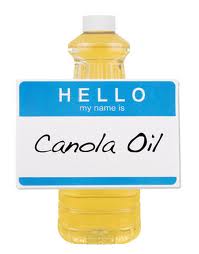
What the in the world is a Canola and why do I have to capitalize the “C”?
Written by Zach Erick
We consume oils in our diets everyday. Whether we’re mixing them with other ingredients, or sautéing vegetables in a pan, oils are a staple in the American diet. There are many different types of oils… Avocado, Coconut, Olive, Grape Seed, Corn, Peanut, Sesame, and finally Canola. It’s easy to identify where 7 out of the 8 oils I just listed come from – it’s literally in their name. Avocado oil from Avocados, Olive oil from olives, etc. But there’s one oil I mentioned that comes from something I’ve never heard of – a “Canola”. What the in the world is a Canola and why do I have to capitalize the “C”?
Canola oil is made from seeds derived from the Rape plant found in Canada. It was originally called Rape Oil, but I guess somewhere down the line marketers thought Canola oil was a better name…. Those guys deserve a round of applause. You have never heard of a “Canola” because it is made up, it is the combination of the words Canada and Oil, Canada+Oil=Canola. Before we used Canola oil to cook with, it was used as a pesticide, lubricant in alternative fuels, as well as oil for lamps back in the 13th century. We now genetically engineer the rapeseed into canola oil for our consumption (1).
Then why is it considered the oil of choice for someone trying to lead a healthier lifestyle? Because it is has less saturated fat than all other oils. In my opinion, the healthiest oil is the most natural–not the one with the lowest fat content. Another negative aspect of the product is that a large portion of canola oil used in processed food has been hardened through the hydrogenation process, which introduces levels of trans fatty acids into the final product as high as 40 percent (2). Higher levels of trans fats mean longer shelf life for processed foods, a crisper texture in cookies and crackers–and more dangers of chronic disease for the consumer (3). In fact, canola oil is banned in many other countries because it is categorized as a Genetically Modified Organism (GMO).
How could something like this be FDA approved and actually suggested over alternative oils? First, it’s cheap to grow, and like I mentioned earlier is used in pesticides, so even in the rapeseeds unmodified state, insects will not eat it. Second, like all other crops in the world, Monsanto has their own patented rapeseed. If you don’t know about Monsanto, which is a whole other topic in itself, for the sake of this article think of them as the biggest, meanest bully in the food industry (From 1965 to 1969, the former Monsanto Company was one of nine wartime government contractors who manufactured Agent Orange.(4) )
In conclusion, I’d like you all to consider the much healthier, natural oil alternatives. Although they are a little more pricey, you can easily find these in any health food store. Personally, I think coconut oil is the most delicious thing in the world (I even put it in my coffee). Before you buy any food always consider where it came from, and how did it get to the state that it’s currently in. You might be putting 50% of your shopping cart back on the shelf.
References
1. “Its use in Northern Europe for oil lamps is documented to the 13th century” Snowdon R et al. “Oilseed Rape”. Chapter 2 in Genome Mapping and Molecular Breeding in Plants: OIlseeds. Ed, Chittaranjan Kole. Springer, 2007 http://en.wikipedia.org/wiki/Canola
2. .JL Sebedio and WW Christie, eds. Trans Fatty Acids in Human Nutrition, The Oily Press, Dundee, Scotland, 1998, pp 49-50. http://www.westonaprice.org/know-your-fats/the-great-con-ola
3. MG Enig, Trans Fatty Acids in the Food Supply: A Comprehensive Report Covering 60 Years of Research, 2nd Edition, Enig Associates, Inc., Silver Spring, MD, 1995. http://www.westonaprice.org/know-your-fats/the-great-con-ola
4. http://www.monsanto.com/newsviews/Pages/agent-orange-background-monsanto-involvement.aspx
Great article Zach! I remember seeing fields upon fields of yellow flowers last year as I drove up toward Glacier National Park in Montana. When I finally got to ask what it was, turns out, it was Canola. Pretty flowers. Substandard oil.
One thing to also mention is that seed oils like Canola are especially prone to oxidation, even at room temperature. I have to agree with you about coconut oil…so tasty!!